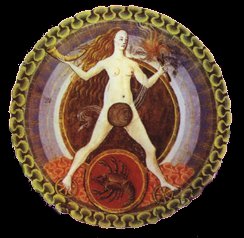|
| In-site navigation |

|
Back to Home
|
| Dealing with Anxiety |
 |
Links coming soon
|
| Links coming soon |
 |
Links coming soon
|
| Additional Links |
 |
Fall 2002
To be announced
|


|
|
 Alchemy Alchemy
|
|
Alchemy is an ancient art of transmutation, based historically on the hermetic mystery-knowledge of the ancient Egyptians. Legend states that the founder of alchemy was Hermes Trismegistus, a name based on the Egyptian god of magic Thoth and the Greek god of wisdom Hermes.
The ancient Egyptians combined metallurgy with hermetic philosophy, seeking the secrets of transmutation and tranformation based on esoteric knowledge. By the 4th Century A.D., alchemy had reached its classical historical period, during which time it became a respected science. The practice focused upon the transmutation of a metal into another metal, but the outward physical changes paralelled an internal, spiritual process of transformation.
By the 19th century, mainstream alchemy became replaced by modern physics. The art of alchemy almost disappeared, until in the mid 20th century a resurgence of intererest occured...inspired to a great extent by Swiss psychoanalyst Carl Jung.
Principles
Alchemy is based on a spagyric philosophy, concerned with reducing material to its basic elements and then recombining the elements to achieve a transformation. This method is reflected in the basic motto of alchemical practice: Solve et Coagula (dissolve and combine).
In western alchemy, the mystical goal of alchemy was the philosopher's stone, a mythical substance which allows the transformation of base metals into gold and represents immortality. In the "inner" tradition of alchemy, the philosopher's stone is taken to be a myth for inner transformation of the spirit.
| |